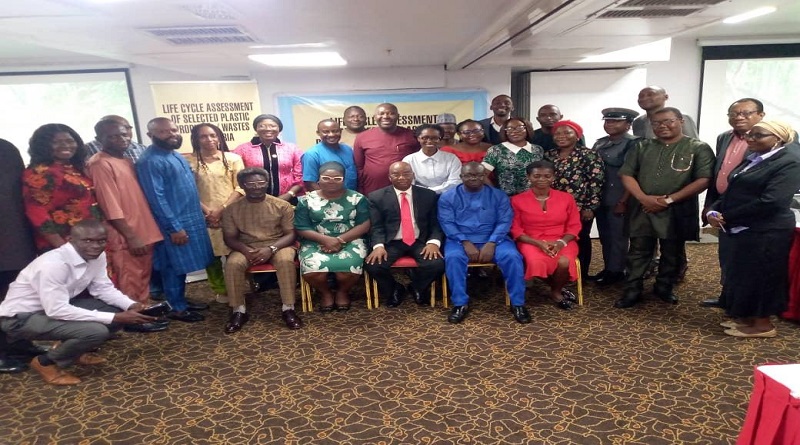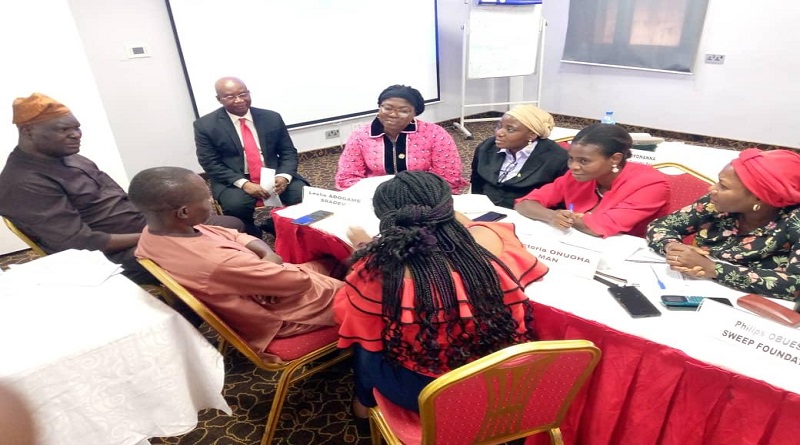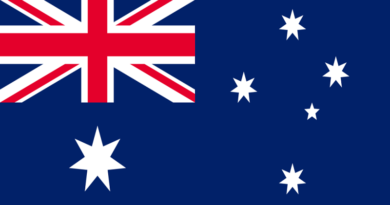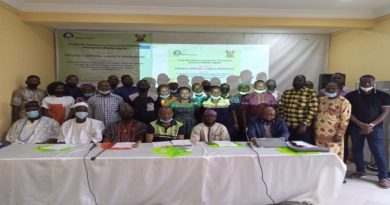Pilot project on life cycle assessment of plastic wastes kicks off in Nigeria
Photo caption: Group photograph of participants during the inception workshop on the life cycle assessment of selected plastic products/wastes in Nigeria held on Tuesday 19th December 2023 in Lagos.
A pilot project that will complement the government of Nigeria’s efforts towards environmentally sound management of plastic wastes in the country has kicked off, the project courtesy of Basel Convention Plastic Waste Partnership (PWP)- proposed and to be executed by the Basel Convention Coordinating Centre for the African Region –BCCC Africa.
The 18-month project titled “Life cycle assessment of selected plastic products/wastes in Nigeria” seeks to identify the most prevalent, and problematic types of plastic waste in Nigeria, carry out comprehensive life cycle assessments of selected four of these plastic products and there wastes.
The assessment will determine the overall environmental impacts of these products, provide information and appropriate recommendations that will guide and support the environmentally sound, prevention and reduction of these plastic wastes.
Under the project, the products/wastes that are envisaged for consideration will include but not limited to PE water sachet packages, PET bottles for water and beverages, flimsy LDPE shopping bags/packs and polystyrene food packages and plastic straws.
At the project inception workshop held in Lagos on Tuesday 19th December 2023, Prof. Percy Onianwa, of the Basel Convention Coordinating Centre for the African Region disclosed that the Plastic Waste Partnership (PWP) was established in 2019 by mandate BC 14/13 of the COPs of the Basel Convention to mobilise business, government, academic and civil society resources, interests and expertise to improve and promote the environmentally sound management (ESM) of plastic waste at the global, regional and national levels and to prevent and minimize its generation.
Participants in a group discussion during the inception workshop.
“Membership to the Plastic Waste Partnership working group is open to Parties to the Basel Convention and other stakeholders dealing with the different aspects of prevention, minimization and management of plastic waste.
In his presentation on ‘Life cycle assessment: Purpose, procedure and reports’ Dr. Babayemi Joshua, said addressing plastic pollution and marine litter requires a new way of thinking that looks at the entire life cycle of plastics.
“A life cycle approach to plastics ensures the identification of key hotspots in the production and consumption system by considering all the potential impacts caused by plastic products/ goods/ services in each stage of their life cycle, from the extraction of raw materials, processing of secondary materials, to product manufacture, distribution, maintenance and use and end of life management.
“A life cycle approach also helps addressing potential trade-offs between environmental impacts and sustainability pillars, and can orient the selection of the best solutions for the environment with best socio-economic implications; to identify key hotspots in the production and consumption system; to preserve the value of plastics and to efficiently design the products for best possible post consumers usage; inform the selection of the best solutions for the environment with best socio-economic implications; provide a scientific basis for the policy makers and concerned or related sectors to formulate decisions for better management of particular processes or production. Hence, the significant effects such as global warming, air pollution, marine litter and acidification level can be minimized,” said Babayemi.
With current estimated population of about 200 million and a Gross Domestic Product (GDP) of 400 million USD, about 2.5 to 5 million tonnes of waste are being generated annually
Unfortunately, plastic waste management in the country is in a poor state, and many reasons are adduced for this: absence of inventory data, lack of policy, poor regulatory framework, poor public awareness, and inadequate recycling facilities, illegal import of poorly recycled plastics and lack of financing schemes among others. No life cycle assessments have been conducted for local plastic products/wastes to provide data on impacts and risk evaluation that could support environmentally sound management of plastic wastes.
Recently, Nigeria committed to tackling plastics waste as two important policies on solid waste management were finalized and approved by the government. A draft plan of activities for plastic waste management was also validated.
These activities included awareness raising, inventory, training of stakeholders, development of standards, establishment of financing schemes and life cycle assessment among other national priorities.
The entire country has been divided into three zones: East, West and North for the field assessment to determine waste plastic prevalence in the country.
The day-long workshop that involved group discussions by participants was well attended by officials of the Federal Ministry of Environment, Lagos State Environmental Protection Agency, non-government organizations, media and academia among others.




